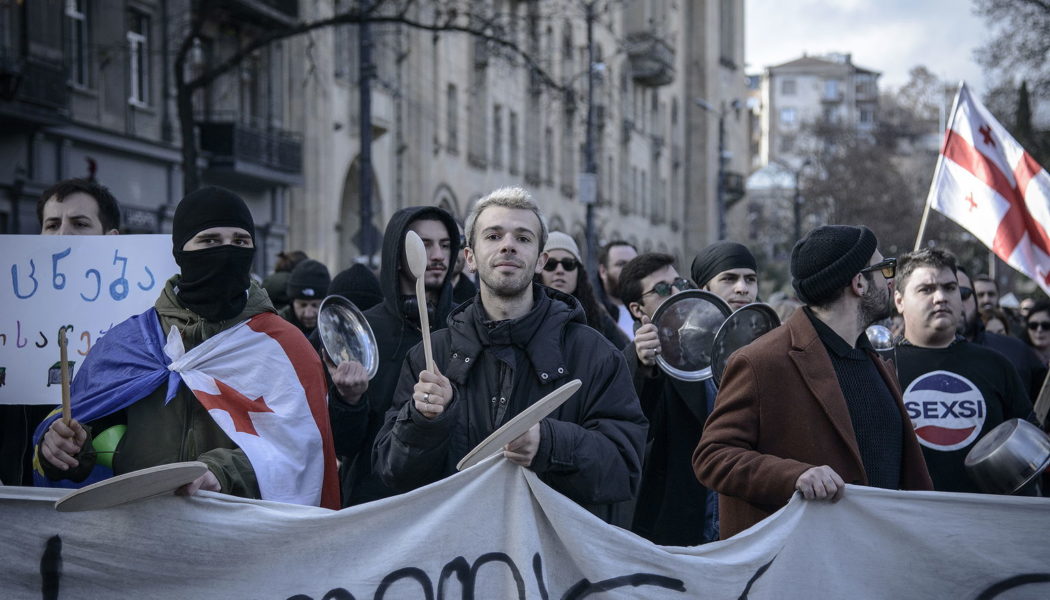Father-daughter journalist team Paul and Nestan Rimple report from the streets of Tbilisi, where nearly every night since protests broke out in October, Chef Tekuna Gachechiladze has been ladling out soup in paper bowls to protesters fighting for their country’s future.
It has been more than a month of nonstop nightly protests here in front of Tbilisi’s Parliament building, the stage of every mass demonstration since 1989, when Soviet forces mowed down 19 people during a rally for independence. If the winter cold is taking a toll on us, you’d never know by the polyphonic songs people are singing, by the traditional dances, noisemaker horns and whistles. The frigid December nights are just a given, like the water cannons and tear gas unleashed to keep us away. But it’s been two months since the pro-Russian Georgian Dream party claimed victory in contested parliamentary elections, and we just keep coming back in larger numbers.
I took my daughter down to the demonstrations on December 1. She’s a talented young photographer, and the previous night Georgian robocops were shooting tear gas and water cannon at kids who were firing back with Roman candles. Masked men known commonly as “titushky” savagely attack demonstrators, journalists, and innocent bystanders. Then the cops arrest and thrash the victims again. My kid’s future was supposed to be assured, but here she is documenting her generation’s fight for Georgia’s independence from Russia. My job is to keep her out of trouble.
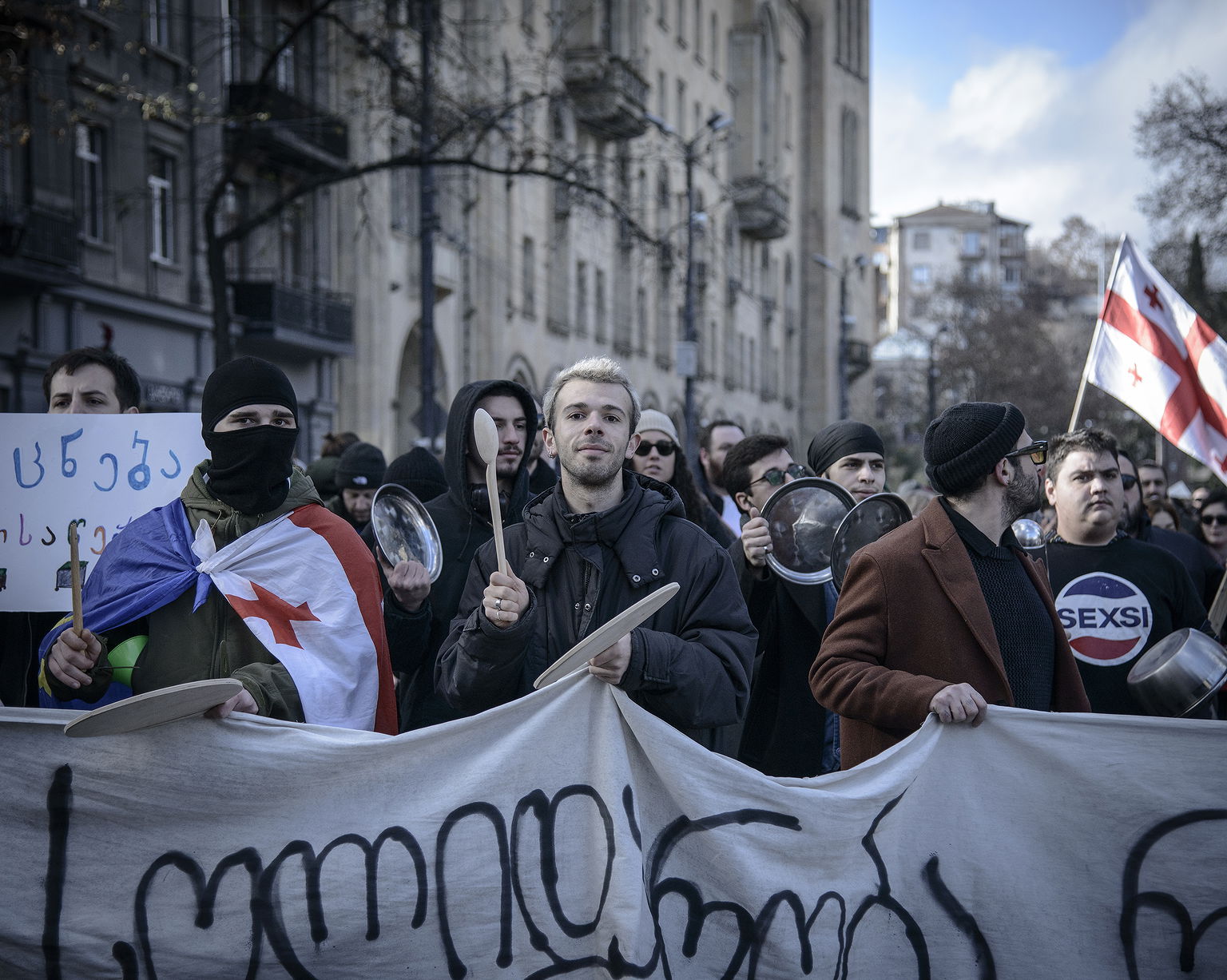
This wasn’t my first demo in Tbilisi. That would be in 2001 at a march accusing President Eduard Shevardnadze’s administration of murdering popular journalist Giorgi Sanaia. That was also my first piece of journalism. I participated in the Rose Revolution in 2003, which saw the end of Shevardnadze and the rise of Mikeheil “Misha” Saakashvili. I dodged Misha’s tear gas in 2007 when thousands demanded his resignation, and I ran from bloodthirsty homophobic priests in 2013 in a pogrom against gay rights activists. I even survived Russians in Gori in August 2008, but my first day out with my daughter I walked her straight into a gas attack.
We made it through the panicked stampede, wheezing, drooling, and crying fiery tears. A few blocks out, we turned up a side street, and kids came running up to our rescue with water, some offering milk for the burning nausea. One guy came up with a bottle of saline solution and rinsed our eyes.
“Don’t touch your face, it will sting,” he said and ran off to relieve other victims. These guys were all prepared, an independent, organic support group fighting peacefully against a tyranny Georgia hasn’t seen since the Bolshevik takeover in 1921. At least that’s how we see it at the barricades.
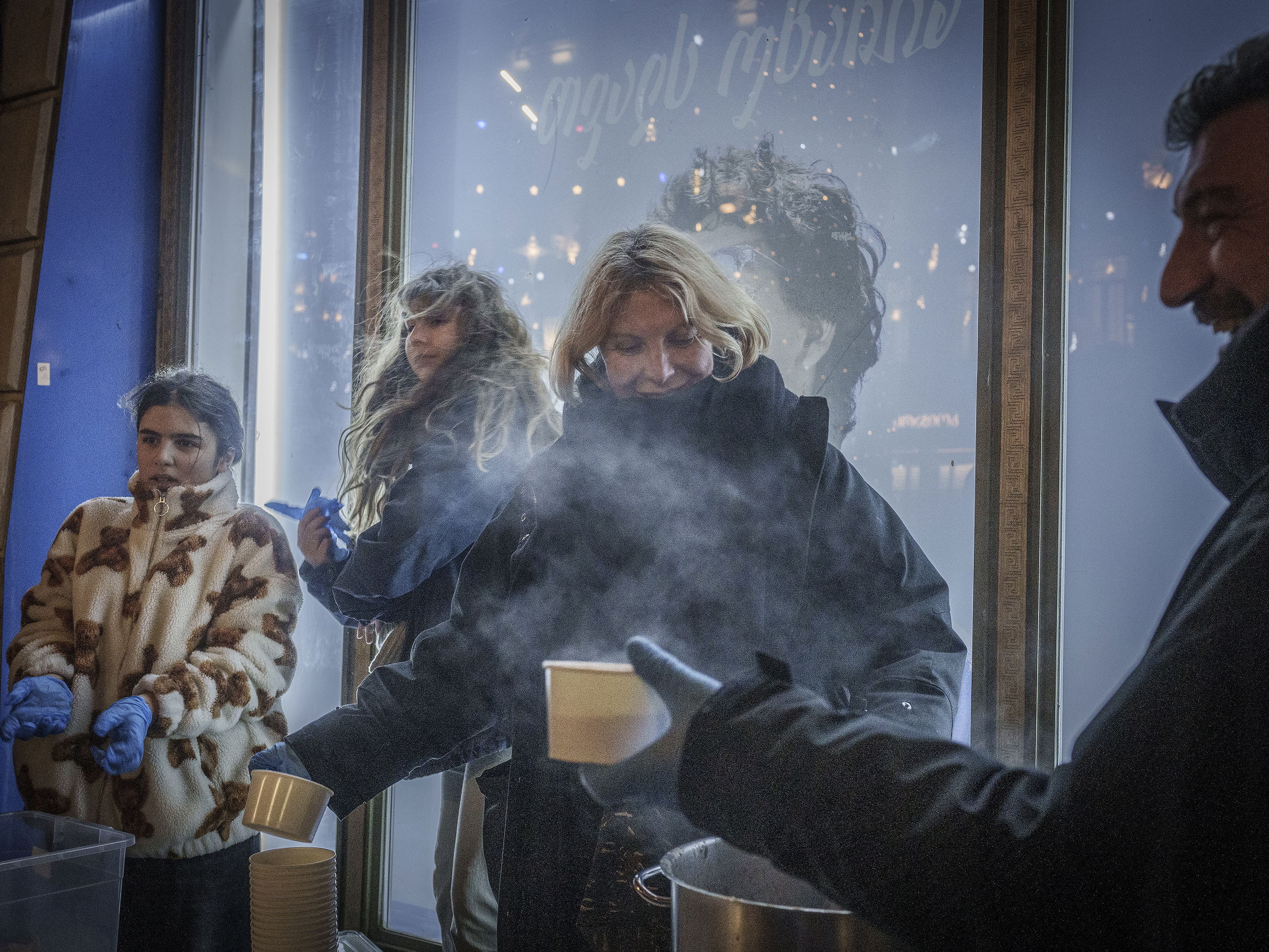
“This is a battle for our survival,” says Tekuna Gachechiladze, the queen of Georgian cuisine, on a brief pause from ladling out soup to protesters. Nearly every night since protests broke out in October, Tekuna has been here in the streets with winemaker Irakli Bluishvili, filling thousands of paper bowls at her little sidewalk soup kitchen.
Chef Tekuna’s story in some ways mirrors the recent ascent of Georgian culture and cuisine on the world stage. She left the country in the lawless 1990s to finish her psychology studies at Columbia University and returned in 1996 as a chef, much to the dismay of her family. In Georgia, cooks held as much professional prestige as street sweepers. She helped a friend establish a French restaurant, opened an American diner, but found her stride at Mandari, a restaurant where she began to combine Georgian and Asian concepts to create the first fusion restaurant in Georgia. Saakashvili was a regular devourer of her Sui Yuk suckling pig and saw how Tekuna’s innovative takes on Georgian recipes harmonized with his vision of a modern country. He often called on her to cater dinners for visiting dignitaries.
The first night I served Artala, then pumpkin, lentil, green pea, meatball… I’m making a resistance cookbook!
When Tekuna opened up Culinarium Khasheria in 2011, the first chef-owned restaurant in the country, she was both Georgia’s first celebrity chef with her own TV cooking show, and a pariah to gastro-nationalists who considered her variations on traditional recipes sacrilege. “But tradition is innovation, Georgian cuisine is fusion by nature… khinkali come from Central Asia,” she says, referring to the succulent dumpling that’s now a sanctified element of the national menu. As international tourism kicked in and Georgian cuisine became a global trend, awestruck food and travel writers inevitably made their way towards Tekuna, while up-and-coming local chefs began to crib her recipes.
While Tekuna’s trajectory was on the rise, Saakashvili’s Machiavellian flair and his “with us or against us” maxim was proving too much for the public to stomach. There were annual protests – 2007 and 2012 were particularly violent. A prison abuse scandal helped elect the Georgian Dream into Parliament. The man behind this coalition was multi-billionaire Bidzina Ivanishvili, the richest Georgian in the world and a former Rose Revolution sponsor.
The billionaire promised an administration of peace and love, along with western integration and “pragmatic” relations with Russia, which has been occupying 20 percent of Georgian territory since its 2008 invasion. Ivanishvili and his team blame the war entirely on Saakashvili, whom they threw in prison after his misguided, dramatic return to the country in October 2021. Georgian Dream kept up pro-western appearances in Brussels for a few years while spouting anti-western slogans at home and consolidating power in all branches of the government and media. They cranked up the rhetoric when Russia invaded Ukraine in 2022, saying a mysterious “Global War Party” of western governments was pushing Georgia into opening a second front against Russia and that the EU would turn people gay – the exact messages the Kremlin was spreading.
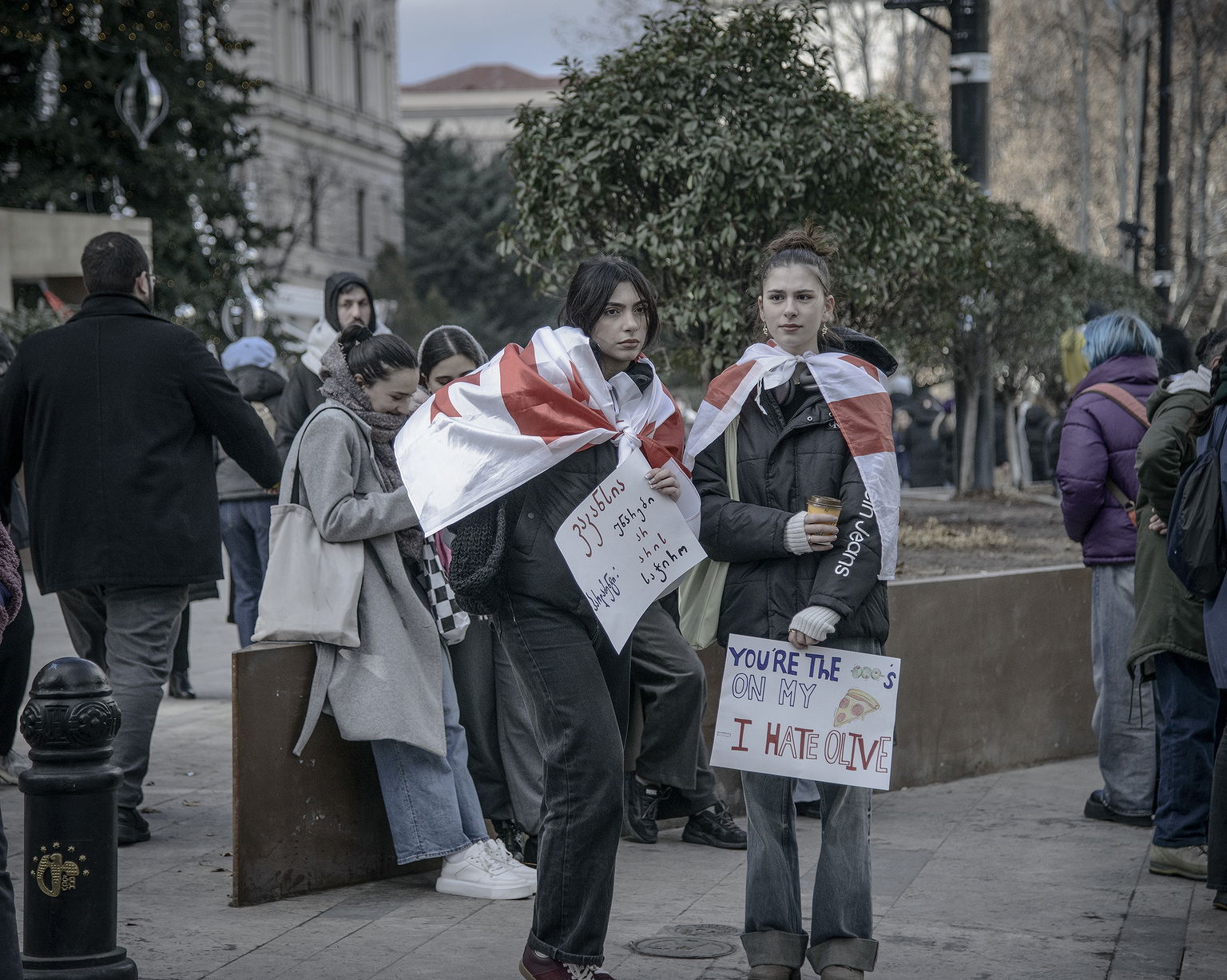
Today’s demonstrations are an extension of those that erupted in 2023, when the ruling Georgian Dream party first introduced a Russian-style foreign agent law designed to eliminate dissent in civil society and free media. Despite massive protests, public outrage, and a presidential veto, the law passed in June 2024 along with sweeping anti-LGBTQ initiatives.
October’s parliamentary elections were a mandate for the country’s geopolitical direction. Through manipulation, intimidation and an overwhelming financial advantage, Georgian Dream claimed victory with 54 percent of the vote. On November 28, the party announced that Georgia would suspend its ascension to the EU for several years, defying the constitution and an overwhelming majority of the populace.
Tradition is innovation. Georgian cuisine is fusion by nature – Khinkali comes from Central Asia.
But they miscalculated the response. Georgia’s young people were born in a European country, club membership or not. They sympathize with Ukraine and resent the sudden arrival of thousands of Russian draft dodgers and economic refugees following Russia’s invasion of Ukraine. Hundreds of thousands continue to come out on the streets ready to take on the gas and water cannon and not just in Tbilisi, but in Telavi, Kutaisi, Batumi, Gori, even the villages. Georgia has never seen an outcry on this scale.
Georgian Dream is at a loss on how to counter the unrelenting resistance. They have outlawed the sale of protective masks, helmets, and laser lights and are restricting the sale of fireworks. I can’t even buy a dust mask at the hardware store. They pass Orwellian laws allowing cops to arrest people who might be thinking of committing crimes. They arrest and beat opposition leaders, not realizing this is a grassroots movement with no leaders, and the more they crack down, the more of us come out.
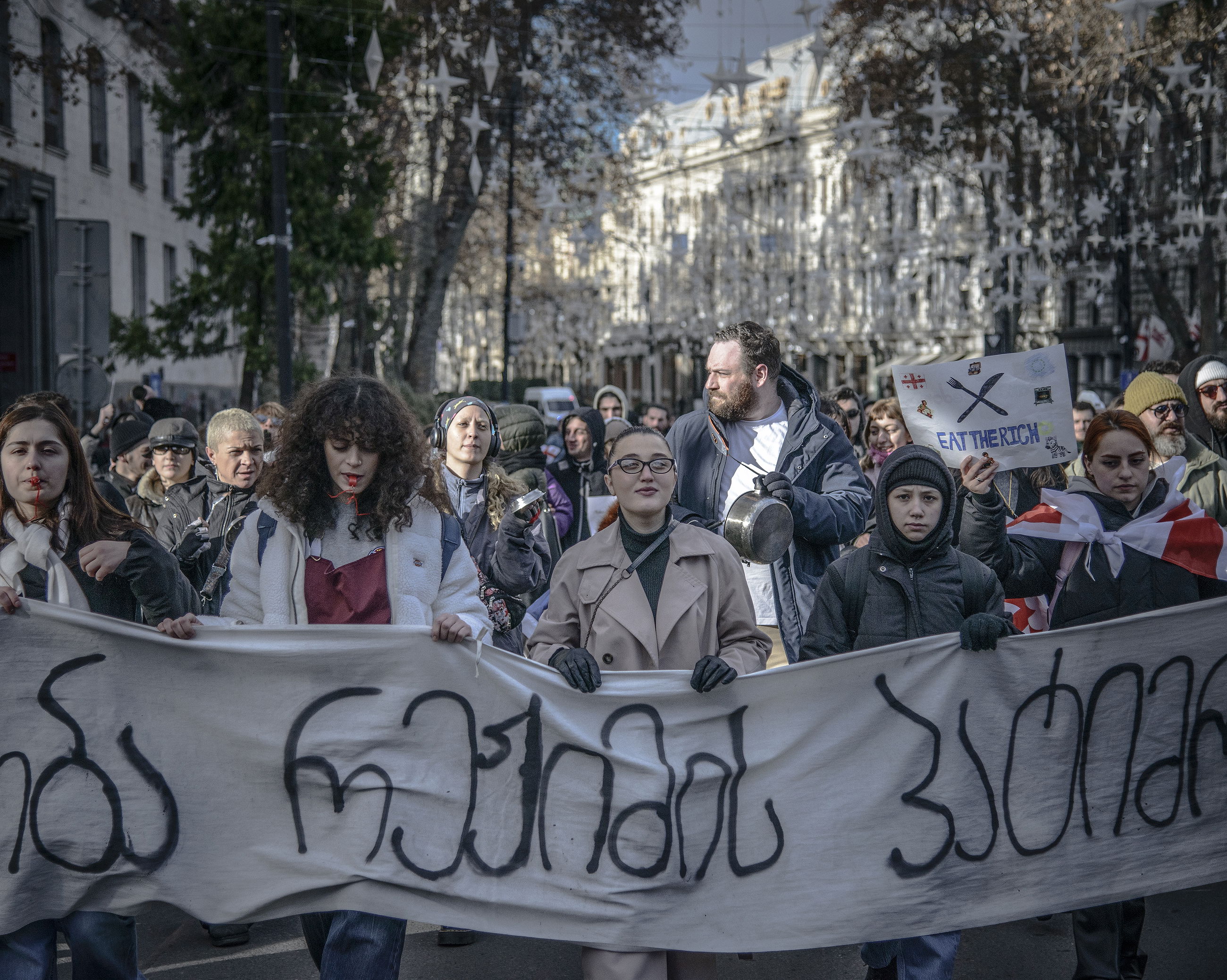
The day after protests broke out, Tekuna shut down her Tbilisi restaurants, Literra, Teko’s Tacos, and the newly opened Apotheka, while continuing to pay her employees’ salaries at considerable financial risk. Many local restaurateurs have done the same.
“How can we serve food when the fate of our country is being fought for on the streets?” Chef Meriko Gubeladze remarked, echoing the sentiment of both restaurateurs and patrons. My blues band has been laid off; this is not the time for live music. The only places operating normally are the Russian-owned bars.
Every night, restaurant and cafe owners set up little pop-ups to serve hot coffee, tea, soups, and snacks. One guy hauled a barbecue and started grilling mtsvadi with his friends before the tear gas chased them away. Chef Giorgi Iosava invites people to use his bathrooms and recharge their phones at Salobie Bia. And there’s Chef Tekuna and Irakli. This is not just a protest; it’s a social movement.
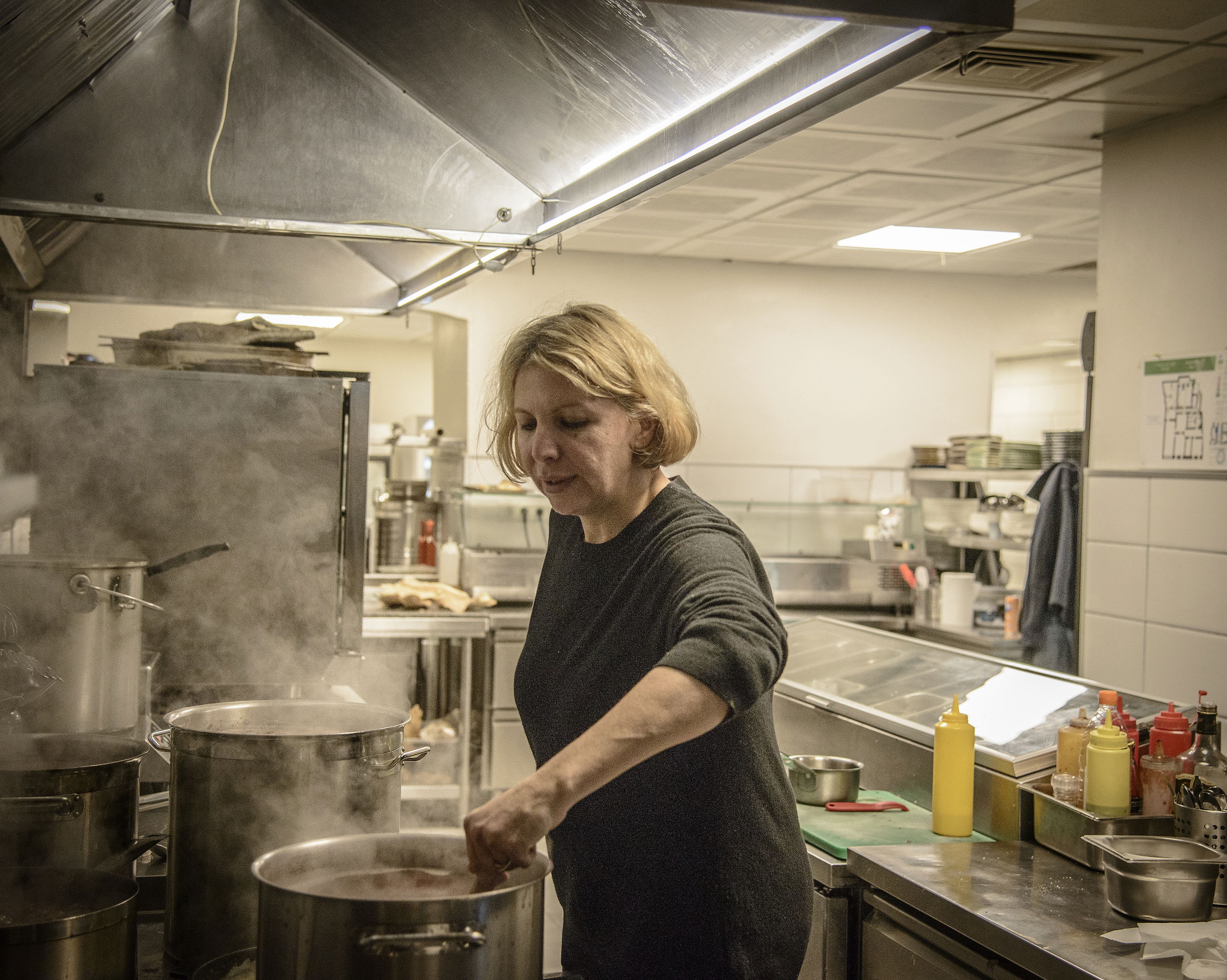
Meriko Gubeladze was among hundreds of service industry professionals, including Tekuna, who participated in a march on December 17 from the central produce market , Dezerter’s Bazaar. Professionals from all walks: IT, lawyers, musicians, theater and film, doctors, teachers, civil servants and more have all held individual marches demanding new elections and the release of political prisoners.
Dezerter’s Bazaar, however, was a contentious starting point, as many of the merchants support Georgian Dream, even though in July they protested City Hall’s announcement to turn the market into a shopping mall, which would put most of them out of business. But EU integration is an abstract notion for people who work long days at the market, then go home and turn on TV and listen to the propaganda: the protesters are homosexuals supported by America who want to start a war with Russia and civil war in Georgia.
“They should just go home. We don’t want war,” vegetable vendor Zura Kakaladze says.
Kristo Talakhadze was also at Dezerter’s. Co-founder of the restaurant Ezo , which also hosts a community center for displaced Ukrainians, she kicked into high-gear activism in 2019 after members of Georgian Dream invited Russian parliamentarian Sergei Gavrilov to address an assembly of Orthodox Christian lawmakers from the Prime Minister’s chair. The protest, known as “Gavrilov’s Night,” was immediate and angry. Police responded with rubber bullets; two students lost an eye. Kristo, Meriko, and other restaurant owners hung notices on their doors welcoming customers as long as they recognize that Russia is occupying 20 percent of Georgia. When Kristo isn’t facing down riot cops, she is serving hot coffee from thermoses while her husband helps feed hungry demonstrators at Ezo, which is currently closed to the public.
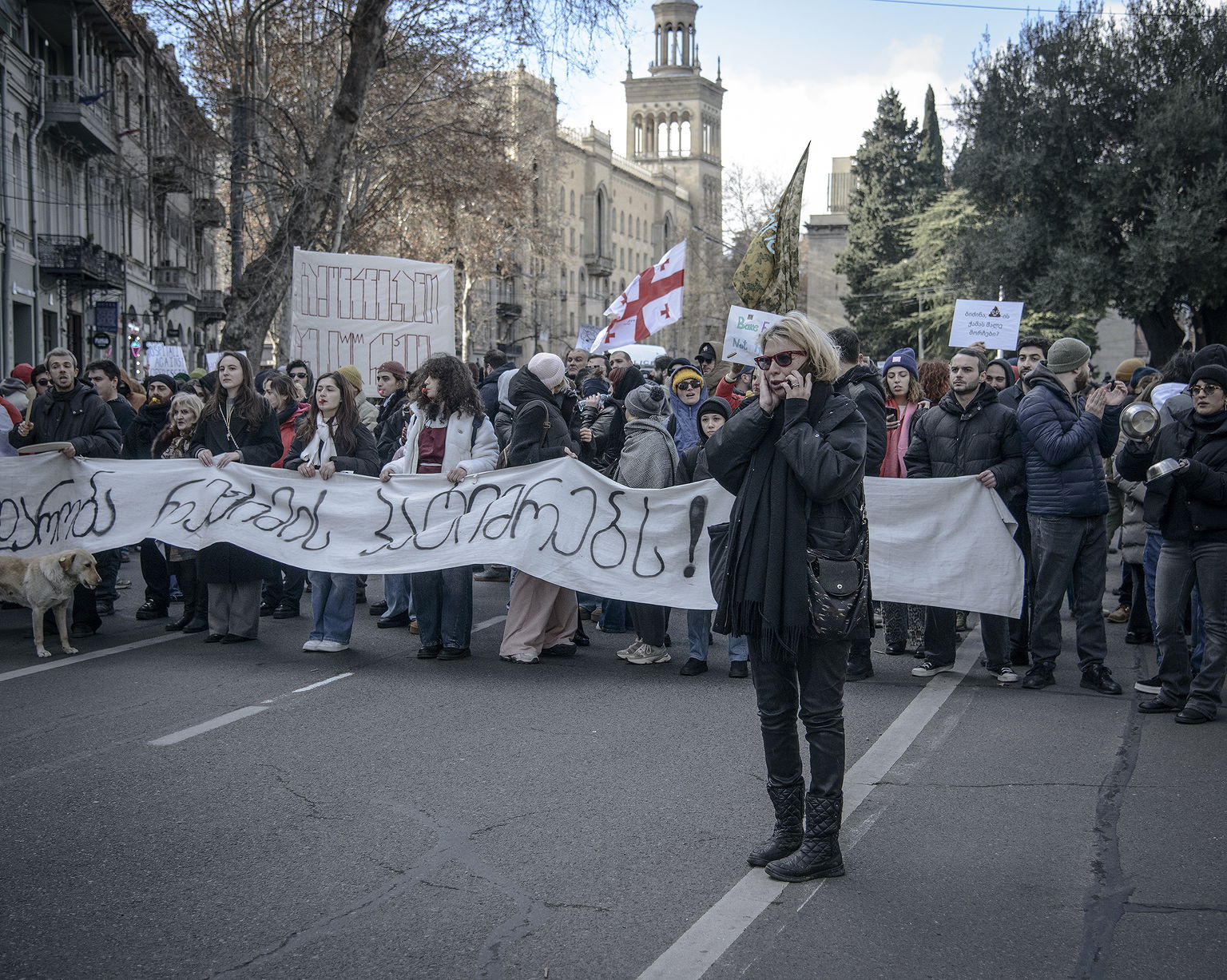
By her own admission, Tekuna has never been much of an activist, but while her restaurants were closed, she came down to demonstrate, and the indefatigable chef thought “it would be good to eat something.” She can’t tally the nights she’s been out in the numbing cold but ticks off the soups she’s made. “The first night I served Artala, then chikhirtma, pumpkin, lentil, green pea, meatball, red lentils and carrots, pumpkin again, black lentils and tonight, beans… I’m making a resistance cookbook ,” she jokes.
Tekuna has catered large events but has never fed the masses like this. Her soups are on the spicy side in response to freezing weather, and now they are meat-free. “I can’t believe how many of these kids are vegetarian. Crazy generation, but it’s good.” The hardest part, she says, isn’t the prep or even the numbing cold but ladling out the last bowl when there is still a line of people.
Now that it’s the holidays, many restaurants are reopening, however reluctantly, including Apoteka. New Years is the busiest time of year, and restaurants depend on holiday income to make it through the rest of winter, the slowest time of year. The question is how many people will have the spirit to celebrate? Seventy percent of Tbilisi’s hotel reservations have reportedly been canceled since Georgian Dream brought out the water cannons and titushky.
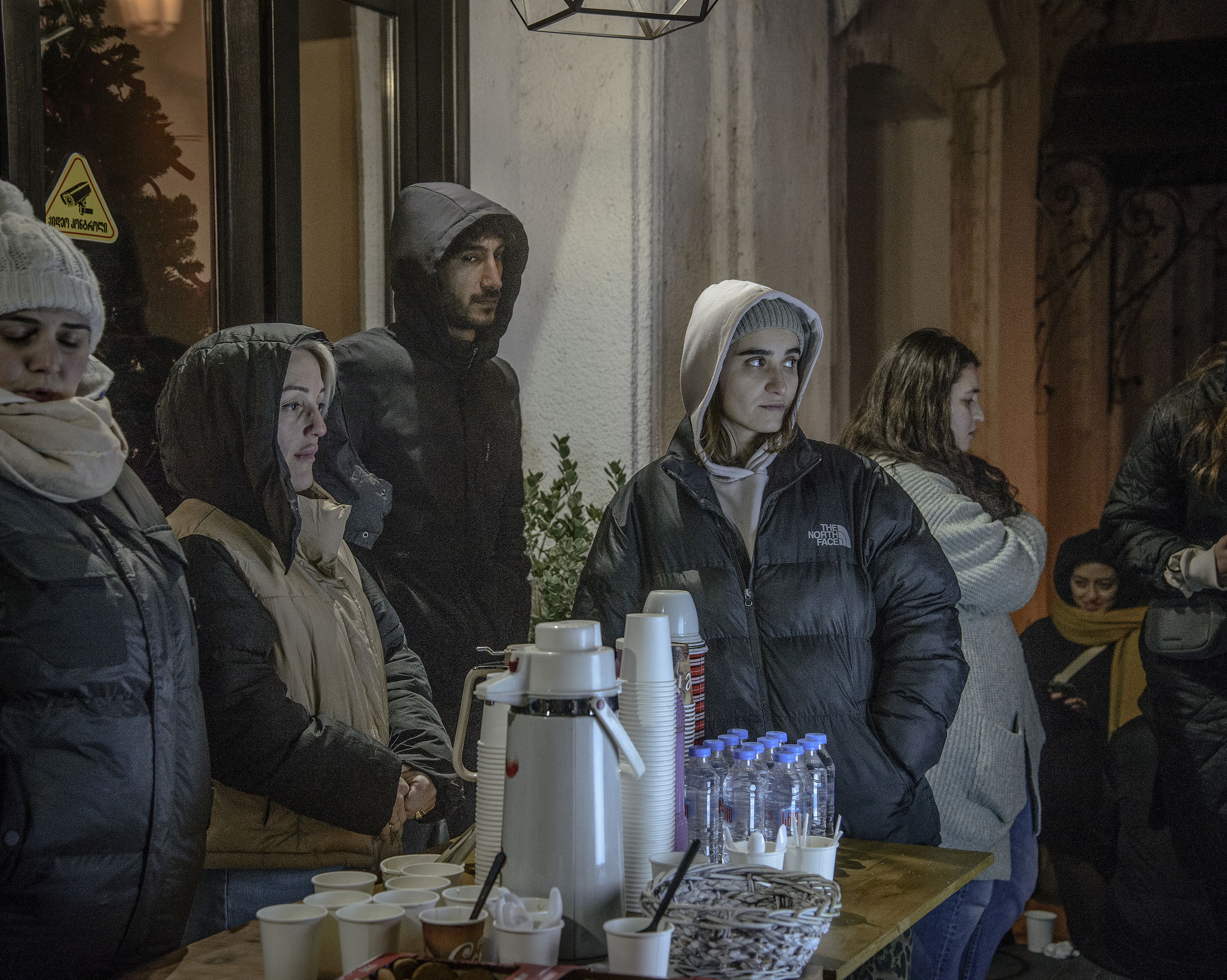
My daughter is good at reading danger now and is not eager to feel tear gas again her life, so I don’t have to worry there. We come down to Rustaveli fearlessly but on alert. The riot cops are mostly taking a break now, their last mass appearance was on December 15, when Mayor Kakha Kaladze announced he was going to officially light the annual Christmas Tree in front of Parliament. There were too many demonstrators. Beating people to light a Christmas tree was too cynical for even him. He turned the lights on without fanfare the following day. Demonstrators decorate it each day with pictures of beaten victims.
People gather in small groups, some wrapped in Georgian and European Union flags, passing cigarettes, blowing whistles, stomping their feet. It’s a routine: work, feed the family, protest at night.
“You think we wouldn’t rather be home watching football?” A friend says. Tbilisi street dogs sniff legs and lounge about the boulevard, happy to have so much company. The titushky are lurking in the shadows, but groups of kids, vigilantes, patrol the side streets, too. Down here on the main drag, the vibe is lax. I see friends and shake hands. “How are you?” they ask. “You know,” I reply. We discuss rumors about Georgian Dreamers who have jumped ship, “Did (former PM) Garibashvili really get beat up for trying to leave?” We complain about the West and its weak response and speculate on Trump’s reaction, a grim reminder of the precariousness of our world now. There’s no room for optimism. It’s understood we are on our own; everyone is in it for the long haul.
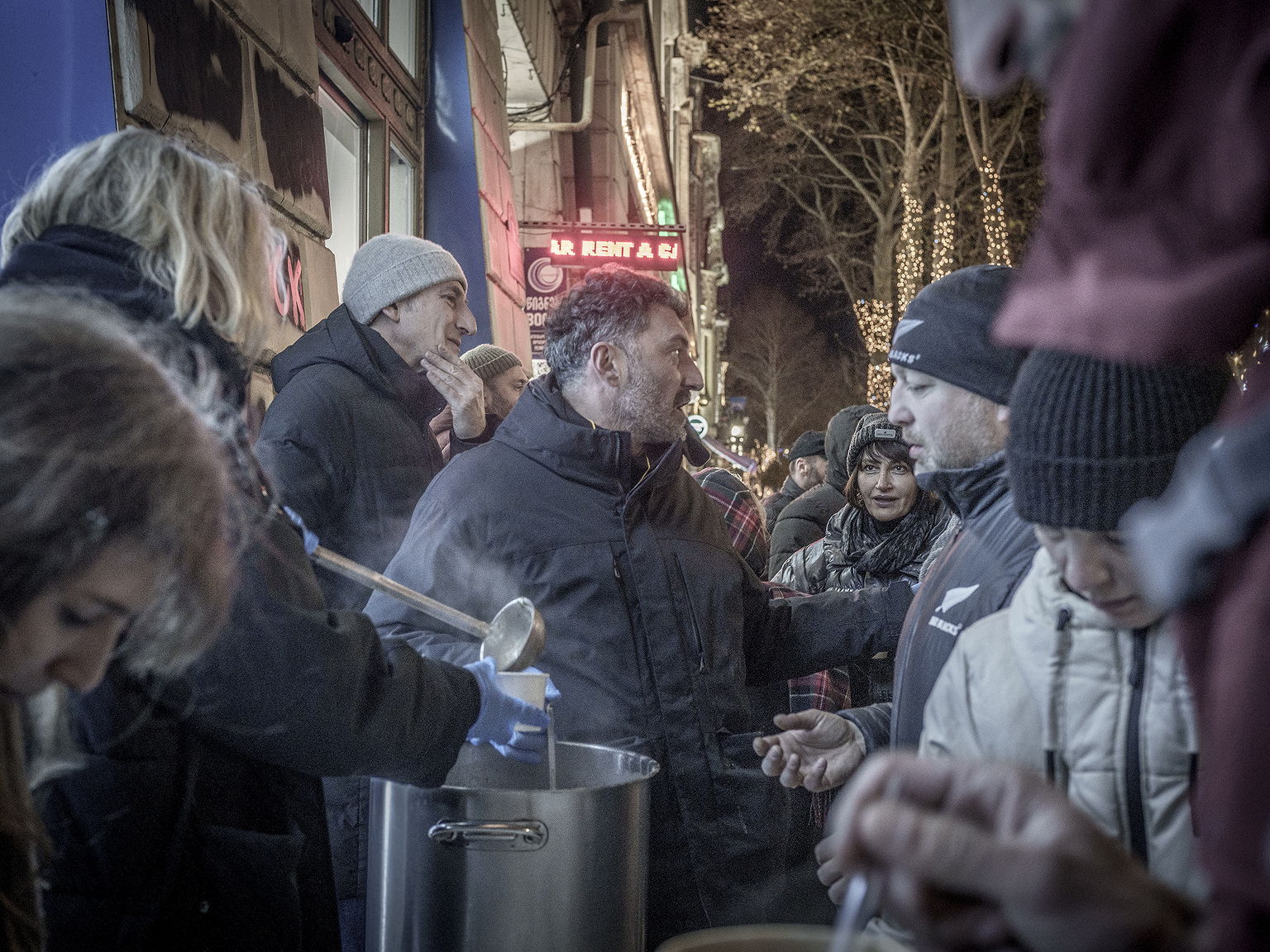
There’s a short but steady line at Tekuna and Irakli’s soup kitchen. Their young teenage daughter is there with some friends helping out. An old friend of Irakli’s comes up rubbing his hands together.
“So, beans tonight?” he asks.
“Well, you know,” Irakli says grinning. “The robocops took our fireworks away.”
